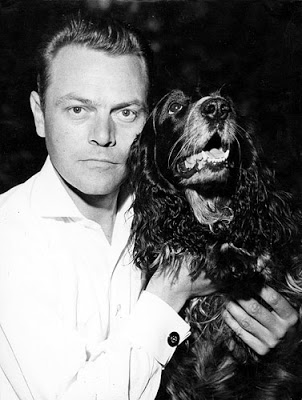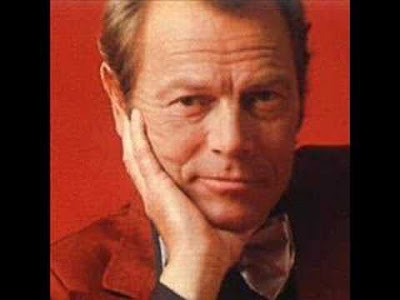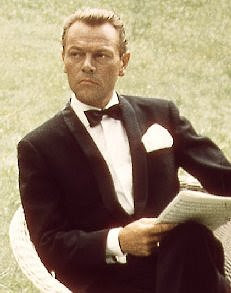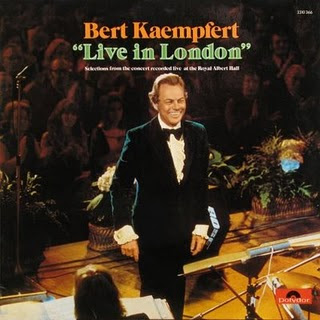Cultura
 Bert Kaempfert
Bert Kaempfert
(Born Berthold Heinrich Kämpfert; 16 October 1923(Barmbek, Hamburg, Germany –
Died 21 June 1980 (aged 56)Majorca- Spain)
Was a German orchestra leader and songwriter. He made easy listening and jazz-oriented records, and wrote the music for a number of well-known songs, such as "Strangers in the Night" (originally recorded by Ivo Robić) and "Spanish Eyes"

He was born in Hamburg, Germany - where he received his lifelong nickname, Fips - and studied at the School of Music there. A multi-instrumentalist, he was hired by Hans Busch to play with his orchestra before serving as a bandsman in the German Navy during World War II. He later formed his own big band, toured with them, then worked as an arranger and producer, making hit records with Freddy Quinn and Ivo Robić. In 1961, he hired The Beatles to back Tony Sheridan on My Bonnie (Lies Over the Ocean), When the Saints Go Marching In, Ain't She Sweet and Cry for a Shadow, in a session for Polydor, the Beatles' first commercial recordings.
Kaempfert's own first hit with his orchestra had been in 1960, with Wonderland by Night. Many of his tunes became better known as hits for other artists:
* Strangers in the Night (with words by Charles Singleton and Eddie Snyder, originally recorded by Ivo Robić), was originally recorded as part of his score for the 1965 film A Man Could Get Killed. It became a #1 hit for Frank Sinatra in 1966.
* Wooden Heart, sung by Elvis Presley in the film GI Blues was a hit in 1961. A cover of "Wooden Heart" performed by Joe Dowell became a big hit in the summer of 1961, reaching #1 on the Billboard Hot 100, on August 28 of that year. Bert arranged this traditional German folk song for the Presley movie.
* His instrumental Moon Over Naples, when given words by Snyder, became Spanish Eyes, originally a hit for Al Martino and also recorded by Engelbert Humperdinck, Presley, and many others.
* Danke Schoen, with words added by Kurt Schwabach and Milt Gabler, became Wayne Newton's signature song.
* L-O-V-E, with words added by Milt Gabler, was a hit for Nat King Cole
* Almost There, Andy Williams
* His 90 Minuten nach Mitternacht (Terror After Midnight) movie theme, with lyrics added by Herb Rehbein and Joe Seneca, became a pop ballad called Love After Midnight, recorded by both Patti Page (1964) and Jack Jones (1966).
* Tenderly, Three O'Clock in the Morning, Red Roses for a Blue Lady , and other American standards which Bert recorded, were covered frequently by other easy-listening or middle-of-the-road performers.
* A jazzier number called A Swingin' Safari was the initial theme tune for the long-running TV game show, The Match Game used on the NBC version from 1962-67. A Swingin' Safari also hit the Billboard charts by Billy Vaughn, the single release peaking at #13 in the summer of 1962. Another 1962 single, That Happy Feeling, became well-known as background music for children's television programming, most notably that of Sandy Becker on his daily WNEW-TV (now WNYW) show in New York between 1963 and 1967.
* Tahitian Sunset was sampled extensively by the lo-fi dance artists Lemon Jelly as their track In the Bath.
* The instrumental That Happy Feeling became a well-known theme song for one of the New York City children's shows, hosted in the early 1960's, by Sandy Becker.

Kaempfert's orchestra made extensive use of horns. A couple of numbers that featured brass prominently, Magic Trumpet and The Mexican Shuffle, were played by both Kaempfert's orchestra and by the Herb Alpert & the Tijuana Brass, whose initially Mariachi style, in fact, evolved towards the Kaempfert style as the 1960s progressed. The Brass covered Magic Trumpet, and Kaempfert returned the favor by covering Brass compadre Sol Lake's number, The Mexican Shuffle. The latter tune evolved into a TV ad, The Teaberry Shuffle.
Many of his hits during this period were composed and arranged with the help of fellow German Herb Rehbein, who became a successful bandleader in his own right. Rehbein's death in 1979 shook Kaempfert deeply. Both Kaempfert and Rehbein were posthumously inducted into the Songwriters Hall of Fame.
In 1967 jazz clarinetist Pete Fountain recorded the album Pete Fountain Plays Bert Kaempfert in Hamburg, Germany with musicians from Kaempfert’s orchestra. It featured Kaempfert’s signature hits.
In 1967 the Anita Kerr Singers released the LP Bert Kaempfert Turns Us On!, a tribute to Keampfert featuring the standard hits.
In 1968 jazz trumpeter Al Hirt recorded the album Al Hirt Plays Bert Kaempfert. It, too, featured Kaempfert’s major hits.
In 1970 Johnny Mathis issued a double-LP album set, Sings the Music of Bacharach & Kaempfert, for Columbia. It consisted of a total 21 tracks in a heavyweight gatefold picture sleeve. The Kaempfert tracks were done in his arrangement style, and the Bacharach tracks were done in the American’s unique upbeat style.

By the 1970s, sales of Kaempfert's music had dropped off somewhat, but he continued to record (his version of the Theme from Shaft was admired by Isaac Hayes himself)[citation needed] and remained popular with audiences. He expanded the musical scope of his band and recorded in a wide variety of styles. He also began to play live concerts with his orchestra, beginning in 1974, with a successful appearance at London's Royal Albert Hall. A cigarette smoker (as illustrated on the posthumous Best of CD), he died suddenly, at the age of 56, following a stroke at his home on Majorca, shortly after a successful appearance in Britain.
Kaempfert used many musicians who were available in Germany and other parts of Europe, including many of the same players who played for James Last, Kai Warner and Roberto Delgado. He featured such top soloists as trumpeters Charly Tabor, Werner Gutterer, Manfred Moch and Ack van Rooyen, trombonists Ake Persson and Jiggs Whigham, and sax/flute player Herb Geller. Drummer Rolf Ahrens supplied the characteristically simple but steady beat, often playing just a snare drum with brushes.
Another contributor to Kaempfert's music was guitarist/bassist Ladislav "Ladi" Geisler, who popularized the famous "knackbass" (crackling bass) sound, which became the most distinctive feature of many Kaempfert recordings - a treble staccato bass guitar sound in which the bass string was plucked with a pick and immediately suppressed to cancel out any sustain. It was Geisler who lent his guitar amplifier to The Beatles for their recording session with Tony Sheridan, after the band's own equipment proved to be inadequate for recording purposes.[citation needed]
- Michael Rabin
Michael Rabin (May 2, 1936 – January 19, 1972) was an American virtuoso violinist of Romanian-Jewish descent. He began to learn the violin when he was seven. His father George, a violinist in the New York Philharmonic, noticed his talent. A lesson...
- Rudolf Serkin
(Hebrew: רודולף סרקין, Russian: Рудольф Сёркин, March 28, 1903 – May 8, 1991, Guilford, Vermont) was a Bohemian-born pianist.) He was born in Eger, Bohemia, Austro-Hungarian Empire (now Cheb, Czech Republic) to a Russian-Jewish...
- Oscar Shumsky
Oscar Shumsky (March 23, 1917 – July 24, 2000) American violinist and conductor, born in Philadelphia to Russian-Jewish family. Oscar Shumsky started learning the violin at the age of three, and made his concert debut at the age of seven with the...
- Itzhak Perlman
Itzhak Perlman (born August 31, 1945) Is an Israeli-American violin virtuoso, conductor, and pedagogue. Perlman was born in Tel Aviv, where he first became interested in the violin when he heard a classical music performance on the radio. He studied...
- Hagai Shaham
Hagai Shaham is an Israeli violin virtuoso. Born in 1966, he began studying the violin at the age of six and was the last student of the late Professor Ilona Feher. As a soloist he has performed with many of the world's major orchestras, including...
Cultura
Bert Kaempfert
 Bert Kaempfert
Bert Kaempfert(Born Berthold Heinrich Kämpfert; 16 October 1923(Barmbek, Hamburg, Germany –
Died 21 June 1980 (aged 56)Majorca- Spain)
Was a German orchestra leader and songwriter. He made easy listening and jazz-oriented records, and wrote the music for a number of well-known songs, such as "Strangers in the Night" (originally recorded by Ivo Robić) and "Spanish Eyes"

He was born in Hamburg, Germany - where he received his lifelong nickname, Fips - and studied at the School of Music there. A multi-instrumentalist, he was hired by Hans Busch to play with his orchestra before serving as a bandsman in the German Navy during World War II. He later formed his own big band, toured with them, then worked as an arranger and producer, making hit records with Freddy Quinn and Ivo Robić. In 1961, he hired The Beatles to back Tony Sheridan on My Bonnie (Lies Over the Ocean), When the Saints Go Marching In, Ain't She Sweet and Cry for a Shadow, in a session for Polydor, the Beatles' first commercial recordings.
Kaempfert's own first hit with his orchestra had been in 1960, with Wonderland by Night. Many of his tunes became better known as hits for other artists:
* Strangers in the Night (with words by Charles Singleton and Eddie Snyder, originally recorded by Ivo Robić), was originally recorded as part of his score for the 1965 film A Man Could Get Killed. It became a #1 hit for Frank Sinatra in 1966.
* Wooden Heart, sung by Elvis Presley in the film GI Blues was a hit in 1961. A cover of "Wooden Heart" performed by Joe Dowell became a big hit in the summer of 1961, reaching #1 on the Billboard Hot 100, on August 28 of that year. Bert arranged this traditional German folk song for the Presley movie.
* His instrumental Moon Over Naples, when given words by Snyder, became Spanish Eyes, originally a hit for Al Martino and also recorded by Engelbert Humperdinck, Presley, and many others.
* Danke Schoen, with words added by Kurt Schwabach and Milt Gabler, became Wayne Newton's signature song.
* L-O-V-E, with words added by Milt Gabler, was a hit for Nat King Cole
* Almost There, Andy Williams
* His 90 Minuten nach Mitternacht (Terror After Midnight) movie theme, with lyrics added by Herb Rehbein and Joe Seneca, became a pop ballad called Love After Midnight, recorded by both Patti Page (1964) and Jack Jones (1966).
* Tenderly, Three O'Clock in the Morning, Red Roses for a Blue Lady , and other American standards which Bert recorded, were covered frequently by other easy-listening or middle-of-the-road performers.
* A jazzier number called A Swingin' Safari was the initial theme tune for the long-running TV game show, The Match Game used on the NBC version from 1962-67. A Swingin' Safari also hit the Billboard charts by Billy Vaughn, the single release peaking at #13 in the summer of 1962. Another 1962 single, That Happy Feeling, became well-known as background music for children's television programming, most notably that of Sandy Becker on his daily WNEW-TV (now WNYW) show in New York between 1963 and 1967.
* Tahitian Sunset was sampled extensively by the lo-fi dance artists Lemon Jelly as their track In the Bath.
* The instrumental That Happy Feeling became a well-known theme song for one of the New York City children's shows, hosted in the early 1960's, by Sandy Becker.

Kaempfert's orchestra made extensive use of horns. A couple of numbers that featured brass prominently, Magic Trumpet and The Mexican Shuffle, were played by both Kaempfert's orchestra and by the Herb Alpert & the Tijuana Brass, whose initially Mariachi style, in fact, evolved towards the Kaempfert style as the 1960s progressed. The Brass covered Magic Trumpet, and Kaempfert returned the favor by covering Brass compadre Sol Lake's number, The Mexican Shuffle. The latter tune evolved into a TV ad, The Teaberry Shuffle.
Many of his hits during this period were composed and arranged with the help of fellow German Herb Rehbein, who became a successful bandleader in his own right. Rehbein's death in 1979 shook Kaempfert deeply. Both Kaempfert and Rehbein were posthumously inducted into the Songwriters Hall of Fame.
In 1967 jazz clarinetist Pete Fountain recorded the album Pete Fountain Plays Bert Kaempfert in Hamburg, Germany with musicians from Kaempfert’s orchestra. It featured Kaempfert’s signature hits.
In 1967 the Anita Kerr Singers released the LP Bert Kaempfert Turns Us On!, a tribute to Keampfert featuring the standard hits.
In 1968 jazz trumpeter Al Hirt recorded the album Al Hirt Plays Bert Kaempfert. It, too, featured Kaempfert’s major hits.
In 1970 Johnny Mathis issued a double-LP album set, Sings the Music of Bacharach & Kaempfert, for Columbia. It consisted of a total 21 tracks in a heavyweight gatefold picture sleeve. The Kaempfert tracks were done in his arrangement style, and the Bacharach tracks were done in the American’s unique upbeat style.

By the 1970s, sales of Kaempfert's music had dropped off somewhat, but he continued to record (his version of the Theme from Shaft was admired by Isaac Hayes himself)[citation needed] and remained popular with audiences. He expanded the musical scope of his band and recorded in a wide variety of styles. He also began to play live concerts with his orchestra, beginning in 1974, with a successful appearance at London's Royal Albert Hall. A cigarette smoker (as illustrated on the posthumous Best of CD), he died suddenly, at the age of 56, following a stroke at his home on Majorca, shortly after a successful appearance in Britain.
Kaempfert used many musicians who were available in Germany and other parts of Europe, including many of the same players who played for James Last, Kai Warner and Roberto Delgado. He featured such top soloists as trumpeters Charly Tabor, Werner Gutterer, Manfred Moch and Ack van Rooyen, trombonists Ake Persson and Jiggs Whigham, and sax/flute player Herb Geller. Drummer Rolf Ahrens supplied the characteristically simple but steady beat, often playing just a snare drum with brushes.
Another contributor to Kaempfert's music was guitarist/bassist Ladislav "Ladi" Geisler, who popularized the famous "knackbass" (crackling bass) sound, which became the most distinctive feature of many Kaempfert recordings - a treble staccato bass guitar sound in which the bass string was plucked with a pick and immediately suppressed to cancel out any sustain. It was Geisler who lent his guitar amplifier to The Beatles for their recording session with Tony Sheridan, after the band's own equipment proved to be inadequate for recording purposes.[citation needed]
loading...
- Michael Rabin
Michael Rabin (May 2, 1936 – January 19, 1972) was an American virtuoso violinist of Romanian-Jewish descent. He began to learn the violin when he was seven. His father George, a violinist in the New York Philharmonic, noticed his talent. A lesson...
- Rudolf Serkin
(Hebrew: רודולף סרקין, Russian: Рудольф Сёркин, March 28, 1903 – May 8, 1991, Guilford, Vermont) was a Bohemian-born pianist.) He was born in Eger, Bohemia, Austro-Hungarian Empire (now Cheb, Czech Republic) to a Russian-Jewish...
- Oscar Shumsky
Oscar Shumsky (March 23, 1917 – July 24, 2000) American violinist and conductor, born in Philadelphia to Russian-Jewish family. Oscar Shumsky started learning the violin at the age of three, and made his concert debut at the age of seven with the...
- Itzhak Perlman
Itzhak Perlman (born August 31, 1945) Is an Israeli-American violin virtuoso, conductor, and pedagogue. Perlman was born in Tel Aviv, where he first became interested in the violin when he heard a classical music performance on the radio. He studied...
- Hagai Shaham
Hagai Shaham is an Israeli violin virtuoso. Born in 1966, he began studying the violin at the age of six and was the last student of the late Professor Ilona Feher. As a soloist he has performed with many of the world's major orchestras, including...
